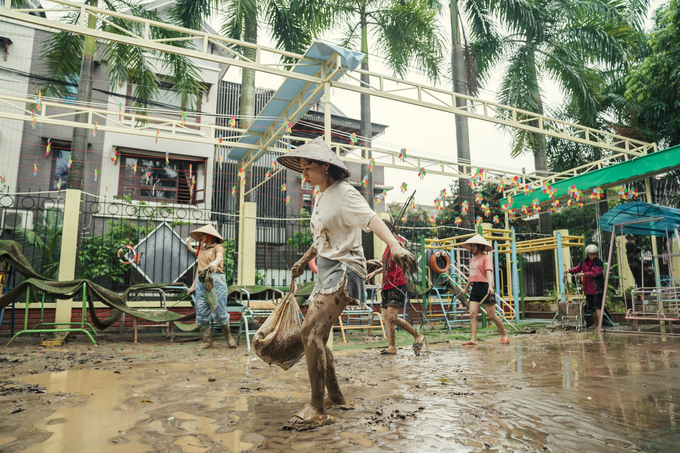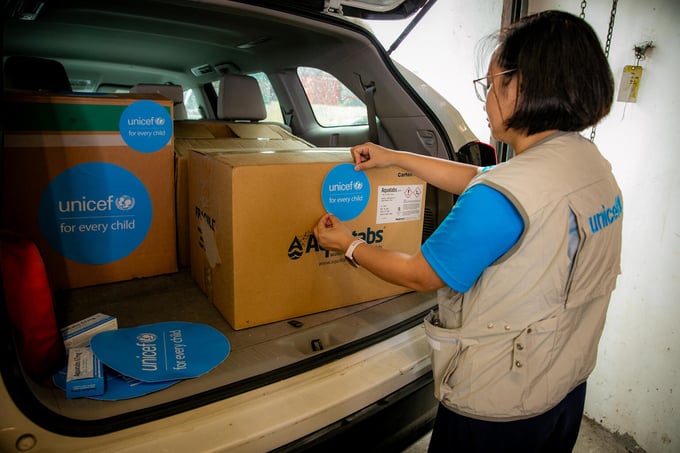November 25, 2025 | 13:22 GMT +7
November 25, 2025 | 13:22 GMT +7
Hotline: 0913.378.918
November 25, 2025 | 13:22 GMT +7
Hotline: 0913.378.918

People in Thai Nguyen were devastated by Typhoon Yagi. Photo: UNICEF.
In support of the Government of Viet Nam’s response, UNICEF is on the ground identifying urgent needs, and providing water supplies for distribution in three of the most impacted provinces.
On September 12, UNICEF has provided water supplies to government partners for distribution to households, hospitals, health facilities and schools in three provinces which are among those most affected by Super Typhoon Yagi. The typhoon was the strongest to hit Viet Nam in decades, sweeping through the country on 7 September and resulting in severe storm damages, widespread flooding, landslides and flashfloods.
In support of the Government of Viet Nam’s response, UNICEF has urgently dispatched 80,000 water purification tablets for the Centre of Disease Control in Thai Nguyen province, and 4,000 liters of water to Lao Cai Provincial Hospital to ensure drinking water supply for 800 people. In the coming days, UNICEF will deliver water purification tablets, water tanks, ceramic filters, hand sanitizers, and soap to government partners to be distributed to households, schools and healthcare facilities in Yen Bai and Lao Cai Provinces.
“UNICEF is committed to urgently providing sustained support to the Government of Viet Nam to ensure children and families have access to essential services”, said Silvia Danailov, UNICEF’s Representative in Vietnam. “We have already started to deliver life-saving support and are mobilizing resources to address the massive needs. Too many children have had their access to essential services like clean water, sanitation, healthcare, and education cut off, and swift action to restore these lifelines is urgently needed. The devastation caused by the typhoon is a tragic reminder of the disproportionate impact extreme weather events, intensified by climate change, have on children.”
Nearly 19 million people, including 5.5 million children, live in the hardest-hit provinces, including Lao Cai, Tuyen Quang, Cao Bang, Yen Bai, Quang Ninh, Hai Phong, Ha Noi, Thai Binh, Hai Duong, Hoa Binh, Thai Nguyen, and Phu Tho provinces. Typhoon Yagi ravaged 26 northern provinces, leaving 324 people dead or missing, including 24 children. It has damaged an estimated 141,469 homes, 550 health facilities, and 805 schools, while around 400,000 homes lack access to safe water. Approximately two million children have been left without access to education, psychosocial support, and school feeding programmes.
National authorities have issued a warning for continued heavy rain, with flash floods and landslides still devastating villages and communities in the northern provinces of the country which are home to a large number of vulnerable communities, including ethnic minorities.

UNICEF has urgently dispatched 80,000 water purification tablets for the Centre of Disease Control in Thai Nguyen province, and 4,000 liters of water to Lao Cai Provincial Hospital to ensure drinking water supply for 800 people. Three among those most affected areas due to Typhoon Yagi. Photo: UNICEF.
In support of the Government of Viet Nam’s decisive and commendable actions to address the impact of the disaster, UNICEF’s priority interventions include:
- Providing water treatment, sanitation supplies, and safe storage solutions to households, health facilities and schools.
- Delivering emergency medical supplies, including vaccines, malnutrition treatment, nutrition supplements, and hygiene kits to health centers in the most affected areas.
- Supporting the reopening of schools by providing temporary learning spaces and educational materials and extending psychosocial support to children affected by the trauma of the disaster.
- Providing emergency kits with essential items – including psychosocial support materials, educational tools, hygiene supplies, and basic health care products – to children and families in the most affected areas.
- Providing payments of humanitarian cash assistance to the most vulnerable households with children and pregnant women, allowing them to meet urgent needs and recover more quickly from the disaster.
UNICEF is mobilizing resources to ensure emergency aid is urgently provided. An initial USD 11 million is urgently required to be able to deliver on its mandate to assist the most vulnerable children. As the full impact of the typhoon unfolds, additional resources will be critical to meeting the urgent needs of children and families in the affected regions.
In support of the government’s response UNICEF is focused on guaranteeing access to safe water, sanitation and hygiene; ensuring that children and mothers continue to have access to health services and nutrition interventions; as well as investments in the sectors of education, child protection and humanitarian cash assistance for vulnerable families and children.
Translated by Dieu Linh

(VAN) Viettel is applying automation technology that helps Vietnamese agro-products clear customs more quickly, cut costs, and maintain quality.

(VAN) Vinh Long, Viet Nam’s ‘coconut capital,’ is facing a major opportunity to advance sustainable agriculture by reducing carbon emissions from cultivation.

(VAN) Ho Chi Minh City still has many areas for improving forest quality, saving energy, reducing emissions, and generating carbon credits.

(VAN) ILDEX Vietnam 2026 will connect more than 250 exhibitors and 10,000 visitors from 40 countries.

(VAN) Hue City is accelerating efforts to combat IUU fishing, aiming to remove EC’s 'yellow card' and promote sustainable fisheries development.

(VAN) The recent torrential downpours and unprecedented flooding in the Southern Central Coast are a highly unusual meteorological and hydrological event.

(VAN) The Southern Central Coast and Central Highlands regions have suffered massive agricultural losses, with over 80,000 hectares of rice and crops, alongside millions of livestock, being swept away, causing severe damage to farmer livelihoods.